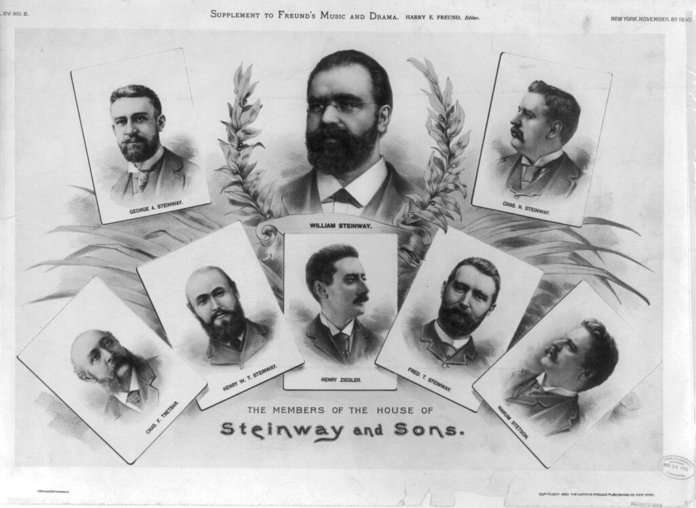
For any emerging family-owned enterprise, a professional endorsement can go a long way to increasing brand awareness and market credibility. But only a select few could make such an impression on those in their field to receive something like this:
“Dear Mr. Steinway, I am very happy to have the opportunity of using your pianos for my concerts. I consider them to be perfect in every way. Faithfully yours,”
Sergei Rachmaninoff
The Mr. Steinway to which the legendary composer and virtuoso Rachmaninoff was referring to, was born Heinrich Engelhard Steinweg in Wolfshagen in Harz (what is now modern Germany) in 1797. After learning the carpenter’s trade and apprenticing under an organ builder, Steinweg fell in love with music and started building pianos in his home. In 1850, he and most of his sons moved to New York where they anglicized their last name to Steinway. Three years later, in 1853, they opened Steinway & Sons, a family-owned piano manufacturing operation.
Hand Crafted Perfection
From the outset, Steinway was determined to produce the very best product found anywhere in the world. To achieve this, every piece of each piano was carefully hand-crafted, a practice that is still observed to this day. Steinway was also one of the earliest instrument manufacturers to introduce innovations based on the latest scientific research.
In fact, R&D was very much at the heart of what Steinway & Sons were about in the early years. The company received their first patent in 1857 and have received 126 in total, more than half of which were granted within the first two generations of the company’s existence. It was Steinway & Sons who introduced the first overstrung grand piano and the cast iron frame, which featured heavier strings and a single soundboard, proving to be better suited for the larger concert halls and soon becoming the industry standard. By 1862, Steinway & Sons pianos received 35 gold medals at trade fairs and exhibitions all over the world.
While these trade fairs were crucial in allowing the company to make a name for itself, it was forward-thinking approach to marketing that really enabled them to dominate the industry. Whereas the majority of piano sales to that point were targeted at the lower end of the market, Steinway & Sons sought to dominate the high-end. To this end, they built Steinway Hall, which served as New York’s premier concert hall until Carnegie Hall opened years later. By 1865, sales topped $1 million and only continued to grow as people associated Steinway with piano excellence.
Steinway & Sons
After Henry Steinway’s death in 1871, the company continued its incredible growth as it was handed down from generation to generation as a family business. Henry’s son William took over until his death in 1896 when his nephew Charles took over. The company remained in the family for more then 100 years until Henry’s great-grandson Henry Z Steinway took the reins in 1955, when it would be the last time a member of the Steinway family would sit as owner and manager of Steinway & Sons.
By the 1970’s, a combination of a culture shift and stiff competition from the Japanese company Yamaha was greatly hurting the bottom line. As a result, Steinway & Sons found itself in the unenviable position that a lot of struggling multi-generational family businesses find themselves in – a family divided between those who want to tough it out and preserve family ownership, against those who want to relieve themselves of a money-losing operation. In the end, Henry Z Steinway sided with the latter group, and in 1972, after 119 years of family ownership, Steinway & Sons was sold to CBS.
But as CBS also struggled to make money with the company, a group out of Boston bought the company in 1985 with a mission to return Steinway & Sons “to its former stature, stressing quality and focusing on the high-end market.” The company was sold again in the 1990’s and is now listed on the New York Stock Exchange under the symbol LVB, honoring Ludwig von Beethoven.
Although the company is no longer owned by the Steinway family, their legacy continues to be preserved as if it were. Today, visitors can stop by the showroom at Steinway Hall and see the beautiful craftsmanship that had made Steinway & Sons pioneers and legends in piano manufacturing.









